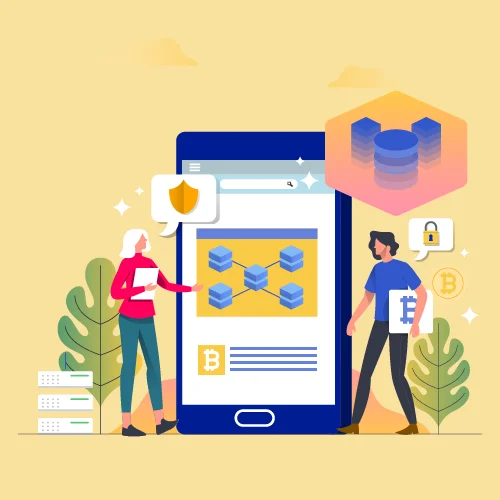- Blockchain Technology
- Types of Blockchain Systems/Solutions
- Types of blockchain based on Networks
- Types of Blockchains based on Cryptocurrency Support
- Blockchain Software Development Platforms
- Factors to Consider for Blockchain App Development
- Languages to Consider for Blockchain Development
- Blockchain App Development: How much time and cost do it require?
- How to Implement Blockchain in Different Business Processes?
- 1. For Transactions
- 2. As a Distributed Cloud Storage
- 3. As Smart Contracts
- 4. For Notary Purpose
- 5. For Supply chain management
- 6. In Digital Identification Process
- 7. In Rewards and Loyalty Programs
- Concluding Thoughts
From news channels to social media platforms and the office group discussions, blockchain has remained the hottest topic for past some years now. And still, there’s no sign that the noise around the blockchain and cryptocurrencies is going to die down anytime soon. And so, we are here with this blockchain app development guide to help you with all the major technical and business aspects of the technology.
With lots of fans and critics, blockchain technology news, with its apps and blockchain development tools are growing in popularity to unimaginable heights. It is becoming the buzzword where even a normal company changing its name and business model according to the blockchain hype is leading to higher profits.
Have any doubt? Let’s clear out!
A UK based organization, On-Line PLC gained significant traffic, higher proposals from investors and share price surge by 394% by just changing its name to On-Line Blockchain PLC.
We know it can be hard to digest? Just have a look at these statistics then,
- In 2017, the blockchain market was about $339.5 billion in size whereas it is forecasted to cross $2.3 billion by 2021.
- According to statistics by Dot Com Infoway, the global blockchain market is expected to be worth $20 billion in the year 2024.
- According to Grand View Research, the global blockchain technology market size was valued at USD 3.67 billion in 2020. It is expected to expand at a compound annual growth rate (CAGR) of 82.4% from 2021 to 2028.
There will be 42.8% blockchain growth per year till 2022 and the main catalyst behind this upliftment will be blockchain adoption in money exchange and growing interest of world’s top banks in creating cryptocurrencies like Utility Settlement Coin (USC) to ensure better cross-border transactions.
- 71% of business leaders using blockchain, as a report, believe that it will play a pivotal role in advancing the technology, resulting in widespread support for industry standards.
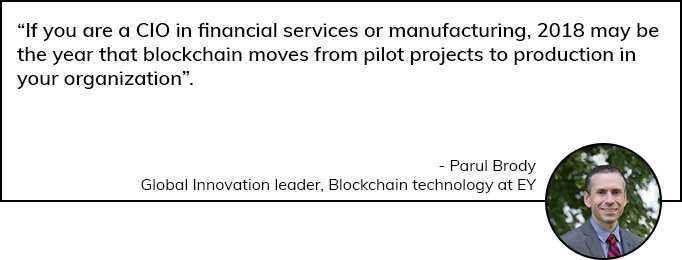
With these mind-boggling stats, it is clear to you that developing Blockchain app and building blockchain projects are soaring as a business focus for several startups and established businesses. From manufacturing to media, telecommunications, finance, banking, healthcare, energy, real estate, and even the government sector is showing interest in the production of Blockchain application development.
So, are you prepared for the revolution called Blockchain Apps Development?
Though Blockchain is a tech breakthrough megatrend with unmatchable potential in the future, it will be completely impractical to invest in blockchain software development with the fear of missing out, without a clear understanding of how can it be useful for your business – something that Blockchain app builders can help you get a clear idea of.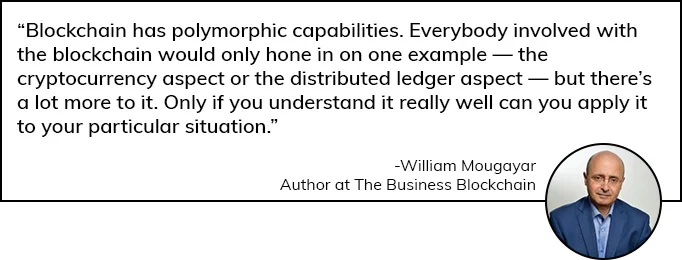
So, in the Blockchain technology development Guide, we will cover the technical aspect of the Blockchain technology along with the ways you can integrate blockchain into your business processes in this article And in case you need something more specific to a business handbook, head on to our personalized Blockchain guide for entrepreneurs.
Blockchain Technology
The answer to How to develop a Blockchain application starts with what it even means. Blockchain, in a layman’s language, is a decentralized, transparent, immutable and publicly accessible database where digital information (transactional record) is stored in blocks and are paired to each other with hash function, such that the current block has the hash code of the previous entry and the next block will have the hash code of the current block.

On the business side, it’s an exchange network for transferring value from peer to peer. It is a mechanism that authorized a transaction and makes it valid from the legal perspective, without involving middlemen.
To better understand the blockchain technology and its working, check out this video:
Now, as you know what is Blockchain software development, let’s dig into the technical aspect of the technology, the meaning of Blockchain based application development, and ultimately the different prerequisites and the time and cost that would go into blockchain application development. All this starting with the blockchain types.
You can also check out how blockchain-as-a-service benefits various business industries through its traits and implementation.
Types of Blockchain Systems/Solutions
The answer to how to develop Blockchain application starts with the categorization of the Blockchain solution type –
- Network
- Cryptocurrency support
Types of blockchain based on Networks
When talking about blockchain development based on network, you can either go for permission less blockchain solutions or permissioned blockchain solutions.
- Permissionless Blockchain: In permissionless blockchains, the whole network in publicly accessible on all the computers and devices. Anyone can access the code, start running a public node on the local devices, initiate an interaction in the network, verify the transaction, and that also while remaining anonymous. In short, the blockchain which is decentralized, equally accessible and anonymously available is said to be Permissionless. Eg: Bitcoin, Ethereum.
- Permissioned Blockchain: It refers to a closed ecosystem where only the authorized participants can act, based upon their particular roles. These types of blockchains are established on a set of rules that govern how a transaction will be implemented to cater the need of a particular organization (for eg: for database management, for auditing, etc.). Eg: Multichain.
However there are 2 types of blockchain, but when it comes to public and private on permissions, the types get further classified as public and permissionless, public and permissioned, private and permissionless, and private and permissioned.
What enterprises are looking for is a private and permissioned blockchain network. Private and permissioned blockchain can also be termed a consortium blockchain.
This type of blockchain system provides core functionalities of the blockchain architecture, like automated data synchronization, immutability, ability to deal with multiple permissions, process automation, and stringent privacy and security features to name a few, and thus pave the way to build more efficient and data-driven business model at a lower cost.
You may like to know: Blockchain: The Technology Revolutionizing Mobile App Security
Types of Blockchains based on Cryptocurrency Support
Based on the cryptocurrency involvement, Blockchains are broadly categorized as Cryptocurrency based and Non- cryptocurrency based solutions.
- Cryptocurrency based Blockchain: As depicted by the name, these types of blockchain solutions run based upon the cryptocurrencies. The popular types of blockchains that fall into this category are:
a. Wallets: These are secure digital wallets that hold the public or private keys with which one can send, store or receive cryptocurrencies. Also termed as Cryptocurrency wallet or crypto wallet, this blockchain type is mainly related to the conversion and trading of cryptocurrencies in a centralized, decentralized or hybrid scenario.
b. Crypto Exchange: These are basically the blockchain systems used to trade cryptocurrencies or digital currencies. They accept credit card payment, postal money orders and other forms of payment and send the cryptocurrency into your cryptocurrency wallet. They are also called Digital Currency Exchange (DCE) systems.
c. ICO: Initial Coin Offerings (ICO) or Initial Currency Offering (ICO) is said to be a crowdfunding system that deals with the generation and selling of cryptocurrencies/crypto tokens.
d. Dapp: A decentralized app or dApp development service is one that deals with apps that is not controlled by a single entity. It can be run by multiple users on a decentralized, P2P network in real-time with the help of trustless protocols. Augur, Golem and Sia are the best examples of what a dApp development company can bring into existence. You might also want to explore; how to make money with your dApp
- Non-cryptocurrency based Blockchain: This type of blockchain app development services solutions do not depend on crypto tokens. Considered basically for inventory management, this blockchain type is based on Distributed Ledger technology (DLT).
Wondering what Distributed Ledger Technology is? From a technical perspective, it is a database distributed across various nodes and computing devices. Here, each node has a replica copy of the ledger and can process it independently. And the most impressive thing is that the ledger is not governed by any central authority.The changes can be made on an individual level and then the node is voted to gain maximum approval. This process of voting where the consent from the majority is necessary for making update is called Consensus. Once the consensus limit is reached, the changes are directly made across the database.
Blockchain Software Development Platforms
While there are more than 25 platforms for building blockchain solutions, the top blockchain platforms that are commonly considered for blockchain/DLT development are:-
- Ethereum: It is an open-source and public platform (and operating system) taken into consideration for blockchain dApp development and ICOs with smart-contract functionality. Unlike bitcoin, it is flexible and adaptable – making it the first choice for every blockchain app development company for building a blockchain app.
- EOS: The aim of EOS platform is to offer smart contract capability, decentralized application hosting, and decentralized storage of the enterprise solutions which solves the scalability issues found in Blockchains such as Ethereum and Bitcoin, along with eliminating all the fees incurred by the users.
- Multichain: It is a platform that empowers blockchain app builders to create and deploy private blockchain solutions to be used within or between multiple organizations.
- LiquidApps: The name behind DAPP Network recently launched DSP 2.0 to make the platform a lot more flexible and powerful. They are capable of supporting a range of dApps creation.
- Hyperledger: It is an open-source platform used to create advanced blockchain software development solutions. For example, building blockchain solutions based on IoT, creating blockchain apps for supply chain management, etc.
- IOTA: It is an open-source DLT based solution used for providing faster and secure payment services between connected IoT devices. This platform uses directed acyclic graph (DAG) technology and offers unique characteristics, like free transactions no matter what the size of the transaction is, faster confirmation times, handling of unlimited transactions at a time, etc. which makes it the ideal platform for building payment systems.
- Quorum: It is an open-source DLT and smart contract platform based on Ethereum.
Blockchain is also widely integrated in P2P payment applications like Venmo for safe cashless transactions.
Now as you are familiar with different blockchain development platforms, you must be confused how to choose the right platform for developing a blockchain system. To make it easy for you, here are some of the factors you need to look out for when answering- How to Develop Blockchain Applications?
[Also Read: Blockchain Analytics – 5 ways blockchain is impacting the data analytics industry]
Factors to Consider for Blockchain App Development
- Nature of Platform: While some blockchain platforms are cryptocurrency based, others are relying on smart contracts or using more than one crypto token. Determining which type is apt for you will make the Blockchain applications development process easier.
- Smart Contracts: The second thing you need to pay attention to is to determine if you need a smart contract or not. A Smart contract, as you might know, is a self-executing protocol that processes, validates or enforces any trigger-based action stored on the blockchain system.
- Consensus Protocol: Different blockchain development platforms work upon different consensus protocol, including Proof of Work, Proof of Stake, Proof of Elapsed time, Proof of Burn, etc. So, identifying the right platform on the basis of consensus protocol is also favorable situation.
- Cryptocurrency: The next thing that you need to consider when answering How to develop a Blockchain app is whether you need the use of cryptocurrencies in your mobile application or not also plays a pivotal role in finding the right platform.
- Public/Private Network: Ask yourself what kind of network you want – one where all are free to make changes or the one where authorized users only can participate. Based on the decision, choose the platform and start creating your own blockchain application.
- Adoption Rate And Functionality: It is vital to look into the Adoption rate and Community Support level for a current blockchain. Adoption rate means the degree of implementation that a specific blockchain innovation has gotten. Picking a technology that has been exceptionally embraced and adopted is a smart choice than picking one with a poor adoption level.
Scalability: Those hoping to build blockchain platforms off of existing innovation should take a gander at the transaction capability and decide whether their requirements will be met. When taking consideration into blockchain scalability three central points are thought of: speed, security, and decentralization. This is known as the Scalability Trilema and points to the fact that any developer can hope to get, at best, two out of three characteristics.
[Also Read: What is the Development Cost of NFT Marketplace in 2022?]
Languages to Consider for Blockchain Development
Alike platforms, there are various programming languages that can be considered while blockchain application development. You can either begin with traditional programming languages like C++, Python, Go, and Java, or turn towards the advanced blockchain-specific languages like Simplicity and Solidity.
- Simplicity: Simplicity is used for smart contracts blockchain development. The language is easy, employs static analysis, and can be seen as an improvement of the basic cryptocurrency languages like Ethereum Virtual Machine (EVM) and Bitcoin Script.

- Solidity: Solidity is a statically-typed blockchain development language used particularly for building smart contracts that run on the EVM. With this language, you can easily implement self-regulated business logic in smart contracts, leaving a non-repudiable and authoritative record of transactions.
Blockchain App Development: How much time and cost do it require?
With all this information, you must be curious about the most asked question, i.e. – How much will it cost to make a blockchain application? Well, it is quite difficult to tell the exact cost directly, provided the blockchain development cost depends on the efforts required. For example, if you wish to develop a blockchain wallet, the average time required will be:-
Process | Time required (in hours) |
Backend Development | 150-200 |
Frontend Development: Android | 500-550 |
Front-end Development: iOS | 470-510 |
Front-end Development: Web/Desktop App | 80-100 |
Design | 120-150 |
Quality Assurance/Project Management | 60-80 |
Likewise, if you build any other blockchain app/system, the time and efforts required will be:
Blockchain Type | Time required (in hours) |
Web Wallet | 250-300 |
Crypto Exchange | 450-600 |
Smart Contracts + Token Issue | 50-70 |
ICO Site | 130-180 |
ICO Full Service | 6,000-8,000 |
With this reference, it might be easier for you to get an estimate of the funds you need. However, don’t treat this as your final quote. The blockchain app development cost varies on the basis of different factors. So, it is better to discuss your app project with a blockchain development companies and find out the exact Blockchain app development cost breakdown structure.
But before you even move on to have that discussion, see if Blockchain is even used in your industry. Here’s a list of Industries in which Blockchain has proved to be of maximum use.
Finance – Fintech is the industry which Blockchain made an entry with. The powering factors that the technology comes loaded with – Transparency and Decentralization is something that has raised the adoption of Blockchain in Finance domain and empowers fintech software development solution by giving birth to a new DeFi and open finance ecosystem
Government –From Dubai to Thailand, various cities have realized the role of blockchain in the government sector and embraced its potential to streamline a number of their processes, straight from voting to land demarcation and a series of other political issues.
Healthcare – Healthcare and Blockchain have a very direct relationship. The latter is used by the former for not just decentralizing the massive amount of data but also to curb the several instances of hacks and security breaches happening because of a lack of decentralized system.
Supply Chain – One of the most direct impact of Blockchain can be seen in the Supply Chain department of Operation Management. The technology makes it possible for the Supply Chain industry to ensure that no loophole is present in the system and there is a complete transparency across all Supply Chain straight from order procurement to delivery.
Real Estate – Because of the massive amount of data and paperwork that the property market deals with, makes Real Estate an ideal recipient of the Blockchain technology. Also, the Smart Contract feature comes in very handy in an industry that deals with numerous contracts.
While these industries are known to be prevalent adopters of Blockchain technology applications, the decentralizing medium is not restricted to them. There are in fact several blockchain for enterprise use cases for adopting the technology in the everyday process.
Also Read: How blockchain technology is revolutionizing the real estate industry
Let us look at some of them –
How to Implement Blockchain in Different Business Processes?
Now as you are familiar with the tech-world of the blockchain, you must be excited to integrate blockchain technology applications into your business. Have a plan or still wondering how to use blockchain for a profitable business transformation?
Blockchain, with its unparalleled potential, can be implemented into your existing business processes in various ways, such as:
1. For Transactions
Being the backbone of Bitcoin and other cryptocurrencies, blockchain technology is all set to revamp transactions. The absence of middlemen will not only speed up the process but also facilitate the service of fund transfer securely at an ultra-low fee. Some real life use cases in firms are: Bitwage, Abra, and Coinpip are using the blockchain for fund transfer and handling payrolls.
2. As a Distributed Cloud Storage
You can also use blockchain to serve your customers with faster, convenient and secure cloud storage facilities like the Storj company did. For the same, you would have to opt for a trusted BaaS provider.
3. As Smart Contracts
Smart contracts can be employed to bypass regulations and cut down the cost for a subset of numerous financial transactions. And the best part is that these contracts are secure and unbreakable.
[Know All About the powering Blockchain feature in our in-depth Smart Contract Guide]
One of the existing applications is Slock, which is an Ethereum-based IoT platform, uses blockchain to empower customers to rent anything by unlocking a smart lock once both the end parties agree to the terms and conditions applied. While Synaps rely on blockchain to provide microloans.
4. For Notary Purpose
Blockchain development can also be taken into consideration for notary creation and authentication purposes. Some real life examples are as follows: Uproov, a smartphone multimedia platform, provides notary creation services using the image, video or sound recording shared by the user via blockchain.
5. For Supply chain management
Since the supply chain mechanism involves components exchange from multiple entities, the failure at one end can affect the overall process. To tackle this situation, the blockchain technology can be used in the form of secure and permanent auditable records where the stakeholders can see the complete processing. Looking for some real-life use cases? SkuChain and Provenance are two such companies using blockchain for streamlining the supply chain system.
6. In Digital Identification Process
Blockchain can be taken into practice to provide us with immutable, indisputable and secure digital identities, resulting in lesser fraud issues and seamless sign-in experience.
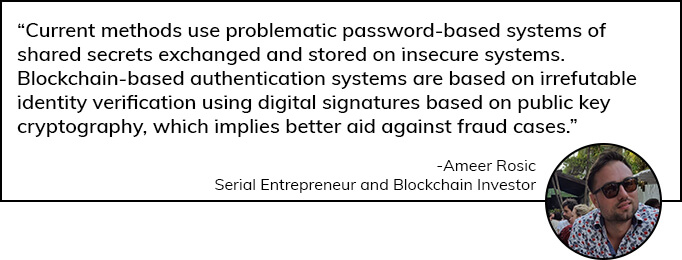
One of the real life use cases is the ShoCard that uses blockchain to verify an identity of individuals on their mobile devices.
7. In Rewards and Loyalty Programs
By eliminating the middlemen, the blockchain aids the retailers to engage their customers with gift cards, rewards, and other loyalty programs in a cost-effective manner.
Wondering if there’s any such existing company/example? GyftBlock, which is a partnership between bitcoin API developer Chain and Gyft, provides digital cards that can be secured traded on the public ledger.
[Also Read: The Rise of Blockchain in Digital Marketing – Benefits, Use Cases and Challenges]
Concluding Thoughts
We hope you found this blockchain app development guide useful!
With all the above-mentioned information and examples, you must have started crafting your own blockchain app development idea. Have you? We would love to listen and contribute to your idea. Let’s meet and discuss!
Get ready to imbibe the changes in your app development ideas and refer to Appinventiv, a trustworthy and reliable company dealing with blockchain and cryptocurrency exchange software development. A company that would help you expand your decentralized journey.



The Rise of Blockchain in Digital Marketing - Benefits, Use Cases and Challenges
Blockchain technology is revolutionizing digital marketing by transforming strategies through its decentralized and secure framework. It provides marketers with unparalleled transparency in campaign tracking and data management, guaranteeing increased security and privacy for users. As the digital landscape is advancing at a fast pace, blockchain in marketing offers the digital marketers with the means to…
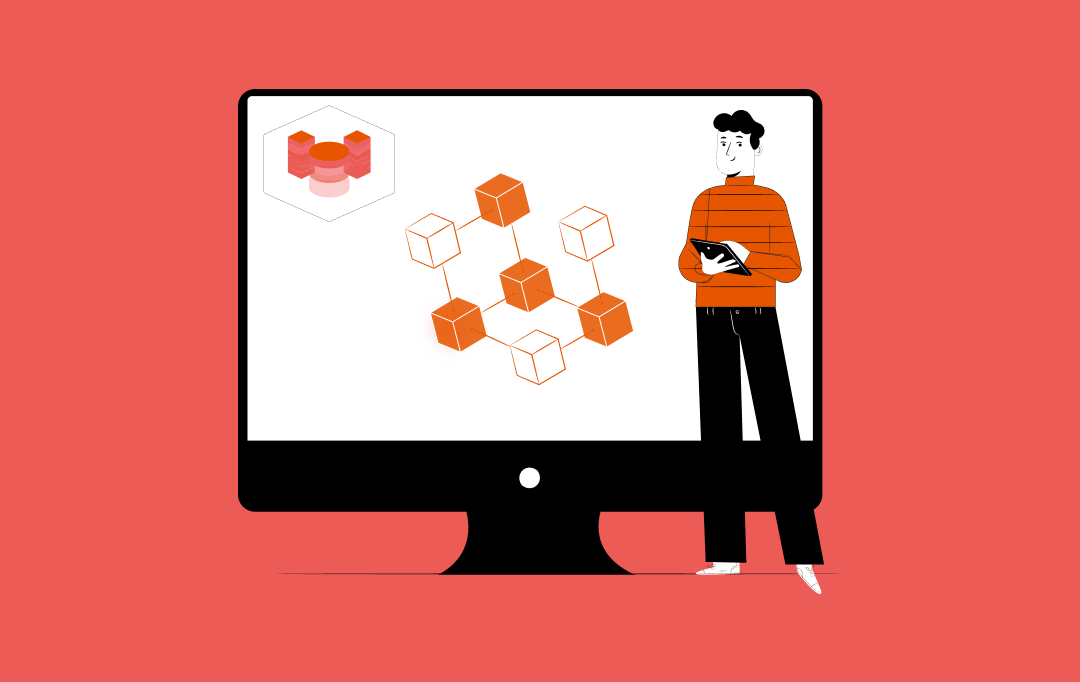
Blockchain Interoperability: The Key to Connect Siloed Blockchain Networks
Blockchain has been a revolutionary response for industries facing the growing pressure of centralized operations’ limitations. By building an ecosystem which runs on zero trust, the technology introduced the world with processes that were incredibly neutral, change-proof, and 100% transparent when compared to their predecessors - traditional computing environment. Having reached a stage where blockchain…





